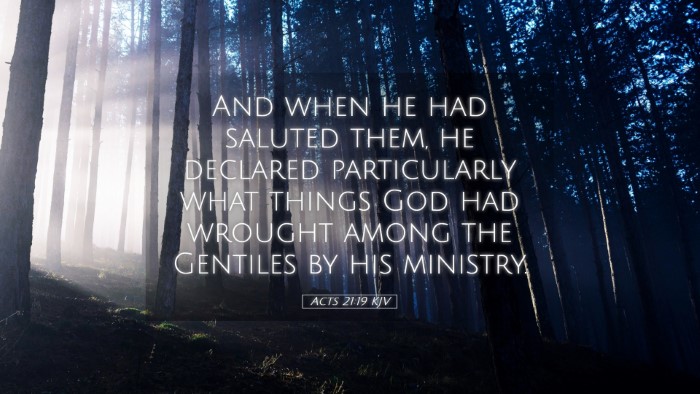Bible Commentary on Acts 21:19
In Acts 21:19, we encounter a pivotal moment where the Apostle Paul addresses the leaders of the Jerusalem church, recounting the work God has accomplished through his ministry among the Gentiles. This verse stands as a profound testimony of God's grace and the dynamic nature of the early Christian church.
Verse Analysis
Acts 21:19 (NIV): "Paul greeted them and reported in detail what God had done among the Gentiles through his ministry."
Contextual Background
The book of Acts, authored by Luke, chronicles the beginnings and expansion of the Christian church, focusing on the ministry of the Apostles. By Acts 21, Paul is returning to Jerusalem, having journeyed extensively to preach the Gospel, encountering both acceptance and opposition.
Historical Significance
Paul’s missionary work among the Gentiles marked a significant shift in the early church's understanding of God's plan for salvation. His reports to the Jerusalem leaders emphasized not only the numbers of converts but also the transformative power of the Gospel, highlighting God's active role in bringing the Gentiles to faith.
Commentary Insights
-
Matthew Henry:
Henry emphasizes that Paul's greeting to the elders reflects both respect and a sense of community among believers. His detailed account of God's work serves as a reminder that the success of ministry is not merely the result of human effort but a demonstration of divine intervention. Paul’s narrative illustrates the importance of sharing testimonies within the church to encourage and edify the body of Christ.
-
Albert Barnes:
Barnes notes that Paul's report is significant as it highlights the fruits of his labor and the grace exhibited through his preaching. He suggests that the mention of Gentiles signifies the breaking down of cultural and religious barriers, emphasizing the universal call of the Gospel. Furthermore, Barnes stresses that such reports should serve to inspire other believers in their own contexts, fostering a culture of praise for God's workings.
-
Adam Clarke:
Clarke provides a theological perspective on the role of testimony in the early church. He points out that Paul's experiences serve as a blueprint for evangelistic efforts among diverse groups. The apostle's willingness to report on God’s workings demonstrates not only accountability but also a commitment to transparency within the leadership. Clarke emphasizes how sharing testimonies helps strengthen the faith of both the speaker and the listeners.
Theological Implications
This verse encapsulates key theological themes relevant for pastors and theologians:
- The Activity of God: The phrase "what God had done" underscores the sovereignty and initiative of God in the salvation history, reminding us that it is God who initiates and sustains His work among His people.
- Inclusivity of the Gospel: Paul's ministry to the Gentiles highlights the Gospel's reach beyond Jewish boundaries, advocating for an understanding of God’s love that transcends cultural and ethnic divisions.
- Importance of Testimony: The act of recounting God's work reinforces the Christian tradition of sharing personal testimonies, which serves to encourage fellow believers and testify to the ongoing work of the Holy Spirit.
Practical Applications
For pastors and church leaders, Acts 21:19 offers several practical applications:
- Encourage Testimonies: Create spaces within church gatherings for sharing what God is doing in the lives of congregants, fostering a culture of celebration and mutual encouragement.
- Highlight God’s Work: Regularly recount and celebrate instances of God’s provision, deliverance, and grace, helping to orient church life around divine action.
- Focus on Mission: Encourage and mobilize the congregation towards outreach efforts that reflect the universal call of the Gospel, demonstrating love and acceptance across cultural divides.
Conclusion
Acts 21:19 provides rich insights into the nature of ministry and the feet-on-the-ground realities of early church leadership. By understanding the nuances of this verse through the lens of established biblical commentaries, we can appreciate the complexities of the Church's mission and the vital role of testimony in witnessing to God’s transformative power. It challenges contemporary believers to consider how they share the works of God in their own lives, fostering a community deeply rooted in faith and mutual encouragement.


